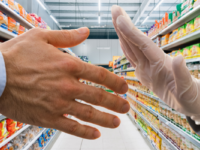 The tide has been turning on big FMCG brands for some time, with the rise of artisan brands spearheaded by millennials and Gen Z; but a more diverse marketplace can only be a good thing, retail futurist Howard Saunders says.
The tide has been turning on big FMCG brands for some time, with the rise of artisan brands spearheaded by millennials and Gen Z; but a more diverse marketplace can only be a good thing, retail futurist Howard Saunders says.
“Big companies are very fragile like never before,” Saunders tells Inside FMCG.
He likens it to a David and Goliath situation, in which consumers have lost trust for big brands and value authenticity and transparency above all.
“We don’t trust the big companies. We count more on authenticity… [young people] are in their bedrooms, looking up stuff, finding out where it comes from. And those big companies that aren’t quite transparent are going to come tumbling down.”
“The way in which we moved against plastic straws unanimously was incredible and it was instant. So the question for big companies is, ‘where does the laser beam of outrage land next?’ Nothing is exempt, because everything we do ultimately hurts the planet a little.”
Saunders points to the stock market crash in 2008 and the arrival of the smartphone as the point when consumers started to question big corporations and seek different alternatives.
“Gen Z have been born into this technology, they have never known anything else… suddenly all the ubiquitous brands that we grew up with look incredibly dull. I think that’s partly the revolution we’re having,” Saunders says.
“The future is that those ubiquitous brands are disappearing from the market. We’re watching the demise of mediocrity… but it’s a good thing, it opens up the market.”

With so much focus on the impact of technology on FMCG, the rise of artisans, who are changing the direction of the industry, is often dismissed.
“We’re not seeing it because we’re focused in the opposite direction. The rise of the artisan is really happening because they’re digital now… they have a global following.”
“I think that we’re going to see the middle classes and the rich will want more and more specialist things. They want to know where their meat was grown, what it was fed on and they’ll pay extra for it… maybe it’ll be delivered by drone and they’ll pay twice as much. Those that aren’t so rich will seek out bargains.”

Similarly the gap is continuing to widen in supermarkets with discounters at one end and a premium offering at the other.
“Big supermarkets are under pressure because they’re neither one thing nor the other… so we’re seeing this polarity. Discounting is getting harder and harder, [stores are becoming] more basic. And if you want to be at the other end you’re going to have to be more artisan and charge more at that end.”
“In the middle where we thought it was quite nice and we wandered up and down the aisle and there was a little smell of the bakery… it’s not working anymore.”
Saunders says whatever brands do emerge in the coming years, they will be operating in a new landscape which is much more binary.
Howard Saunders is a retail futurist based in the UK. He will be speaking at the Food and Grocery Australia conference in Sydney May 28-30.















